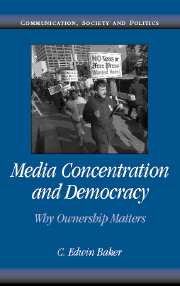Book contents
- Frontmatter
- Contents
- Preface
- Introduction
- 1 Democracy at the Crossroads: Why Ownership Matters
- 2 Not a Real Problem: Many Owners, Many Sources
- 3 Not a Real Problem: The Market or the Internet Will Provide
- 4 The First Amendment Guarantee of a Free Press: An Objection to Regulation?
- 5 Solutions and Responses
- Postscript: Policy Opportunism
- Notes
- Index
- Titles in the series
1 - Democracy at the Crossroads: Why Ownership Matters
Published online by Cambridge University Press: 05 June 2012
- Frontmatter
- Contents
- Preface
- Introduction
- 1 Democracy at the Crossroads: Why Ownership Matters
- 2 Not a Real Problem: Many Owners, Many Sources
- 3 Not a Real Problem: The Market or the Internet Will Provide
- 4 The First Amendment Guarantee of a Free Press: An Objection to Regulation?
- 5 Solutions and Responses
- Postscript: Policy Opportunism
- Notes
- Index
- Titles in the series
Summary
Authoritarian regimes regularly try to censor or control the mass media's provision of vision and information. The health of democracies, in contrast, depends on having a free press. Edmund Burke reportedly observed that “there were Three Estates in Parliament; but, in the Reporters' Gallery yonder, there sat a Fourth Estate more important far than they all.” Among many others, Supreme Court Justice Potter Stewart saw the democratic role of this Fourth Estate as central to the rationale for constitutional protection of the press. Of course, much more must be said about the idea of democracy before fully understanding its implications for the ideal of a free press. Questions include: What is the best conception of democracy? How do alternative conceptions of democracy suggest different ideals – and different constitutional interpretations – of “press freedom”? Even the notion of “fourth estate” requires unpacking. (I often use this term and the idea of the press's watchdog role interchangeably, but more precisely the watchdog role consists in being a “check” against abuse by government, while the fourth estate role may include that plus a more active involvement in governing and in influencing which political possibilities prevail.) Though these questions require investigation, the initial point is simple: democratic concerns should be central in formulating legal policy relating to the press. Legal rules that inevitably structure the press as an institution should embody, to a substantial degree, democratic values or ideals.
- Type
- Chapter
- Information
- Media Concentration and DemocracyWhy Ownership Matters, pp. 5 - 53Publisher: Cambridge University PressPrint publication year: 2006
- 1
- Cited by



